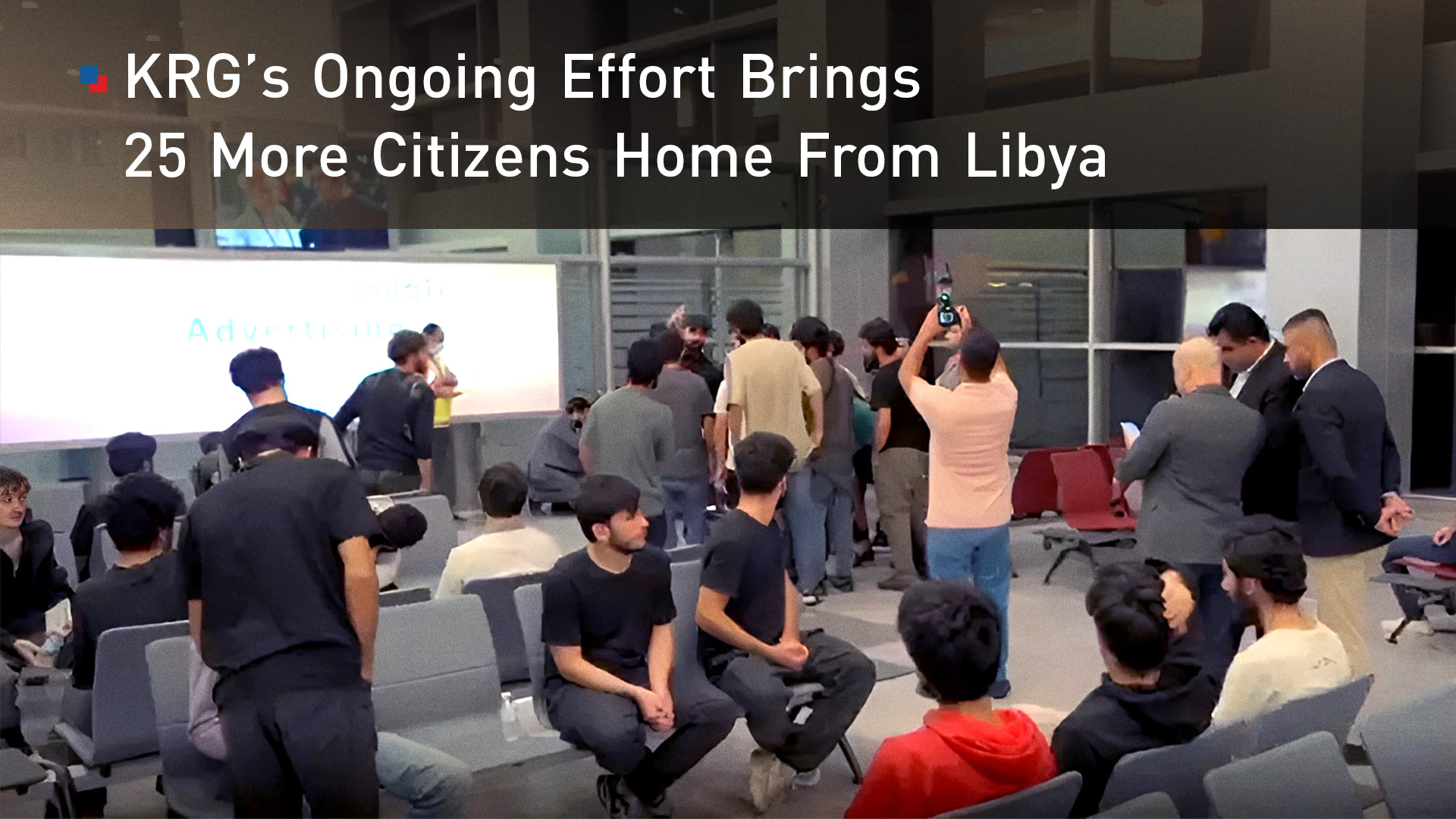KRG’s Ongoing Effort Brings 25 More Citizens Home From Libya
The KRG has successfully repatriated 25 more of its citizens who were detained in Libya after attempting to illegally migrate, continuing its life-saving efforts.

ERBIL (Kurdistan24) – In a continuing and determined effort to bring its citizens home from one of the world's most dangerous and lawless migration corridors, the Kurdistan Regional Government (KRG) on Friday announced the successful repatriation of another 25 of its citizens who had been arrested and detained in the fractured state of Libya.
The group of young men, who had embarked on the perilous and illegal journey in the hope of reaching Europe, arrived at Erbil International Airport early Friday morning, their return secured and funded entirely by the KRG.
This latest operation comes less than two weeks after the KRG facilitated the return of a larger group of 40 citizens from Libya, a repatriation that was accompanied by harrowing, first-hand accounts of brutal beatings, starvation, and deadly medical neglect inside the country's notorious detention centers.
The steady and consistent pattern of these government-led returns underscores both the alarming frequency with which young people from the Kurdistan Region are falling victim to the treacherous Libyan route, and the KRG's unwavering commitment to intervening and ensuring their safe passage home.
In a statement released on Friday, the KRG's Department of Media and Information confirmed the arrival of the 25 citizens. The statement detailed the comprehensive reception process that was immediately put into place upon their landing.
"After their return to the soil of the Kurdistan Region, teams from the Ministry of Interior and the Department of Foreign Relations, medical and assistance teams, were with the freed individuals and the necessary medical examinations were performed for them," the statement read.
This multi-agency response is a standard and crucial part of the repatriation process, designed to address any immediate health or psychological needs of the returnees after their traumatic ordeal. "After the completion of the procedures to ensure their safety, all the freed youths were returned to their relatives," the statement concluded.
The return of this group of 25 follows closely on the heels of the repatriation of 40 other citizens on Sunday, October 26, a clear indication of the sustained and active nature of the government's efforts.
While Friday's announcement did not include new testimonies from the returnees, the accounts provided by the previous group paint a vivid and disturbing picture of the conditions they likely endured.
Survivors from the October 26 flight spoke of a complete breakdown of human dignity and basic rights inside the Libyan detention system.
"We saw several hardships there... there are no human rights, nothing at all," one young man had recounted. "There is no food, our situation was bad, there was no medical care, there was nothing, nothing at all." Another described a prolonged period of near-starvation, receiving only "one small loaf of bread a day," and witnessed the fatal consequences of the systemic medical neglect.
"All of us had fallen ill, and no one would take us to a doctor," he lamented. "Because the friend who was with us lost his life... even if we were sick, they wouldn't take us to a doctor." Yet another survivor spoke of witnessing a friend being beaten so severely that "for three days his body was black and blue."
These harrowing testimonies directly corroborate the extensive documentation by international bodies like The Global Detention Project, which has detailed persistent and severe abuses across Libya’s network of detention centers, many of which are controlled by powerful militias.
Overcrowding, starvation, and rampant physical and sexual abuse are widespread in a system where the rule of law is virtually non-existent.
Libya's role as a critical and deadly transit hub for migrants is a direct consequence of the chaos that has engulfed the country since the 2011 ouster of Muammar Gaddafi.
The ensuing power vacuum allowed a deeply entrenched network of human smugglers and traffickers to flourish, exploiting the desperation of migrants fleeing poverty, conflict, and persecution from across the Middle East and Africa.
The journey itself is a litany of horrors long before migrants even reach a detention center. Many perish in the vast and unforgiving Sahara Desert.
Those who survive often fall prey to kidnapping for ransom, forced labor, and torture at the hands of traffickers and armed groups.
The situation has been further complicated and, according to some analyses, exacerbated by European policies.
A recent investigation by the French publication Le Monde diplomatique argued that the European Union’s push to curb Mediterranean crossings by funding and cooperating with Libyan authorities, including the coast guard and various militias, has "supercharged" the country's extortion economy, effectively turning migrants into pawns in a lucrative and cynical game.
Against this dark and complex backdrop, the consistent and proactive repatriation efforts by the KRG serve as a crucial and often life-saving lifeline.
The government's willingness to dedicate significant financial and diplomatic resources to locate its citizens, negotiate their release, and fund their return is a powerful demonstration of its commitment to its people, wherever they may be.
As yet another group of young men is safely reunited with their families, their return serves as both a moment of profound relief and a stark and urgent reminder of the profound dangers that continue to lure the region's youth into the deadly and lawless labyrinth of the Libyan migration route.